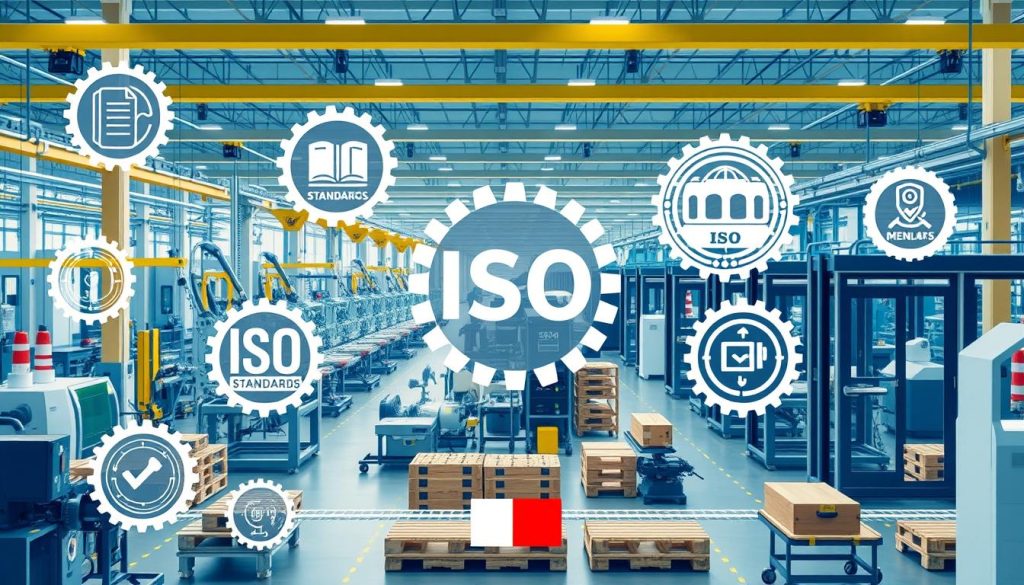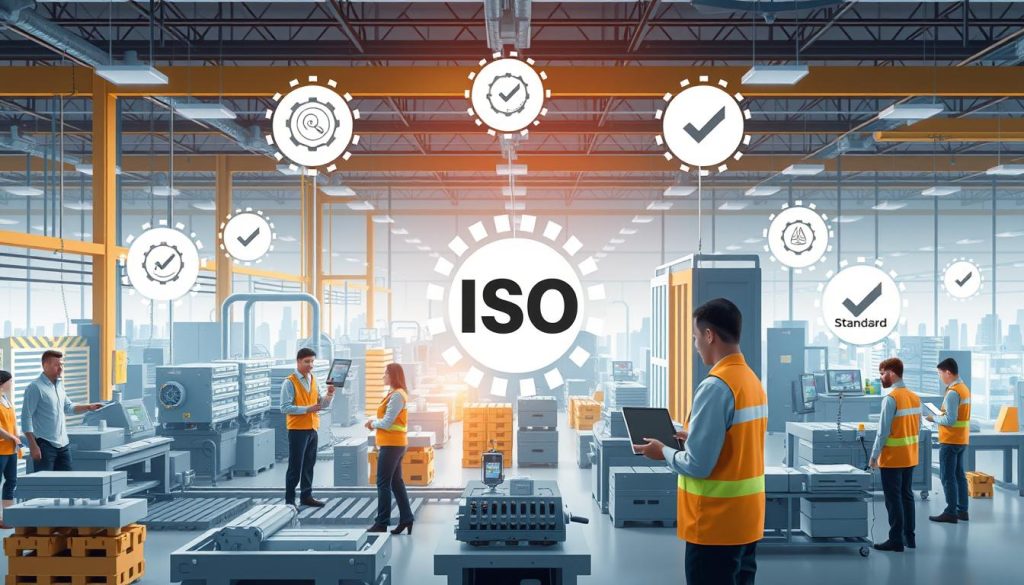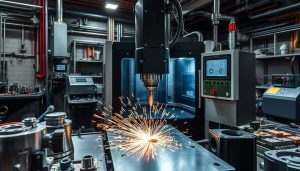The manufacturing world is always changing. It’s filled with quality standards and rules to follow. But, there’s one set of guidelines that shines: ISO standards. These ISO standards are key for the manufacturing world. They help guide quality, safety, and more.
So, what are ISO standards, and how do they help manufacturers? Let’s explore the most common ISO standards in manufacturing together.
Key Takeaways
- Discover the essential purpose and significance of ISO standards in the manufacturing industry.
- Explore the top ISO standards that are shaping the future of quality, environmental, and safety practices in manufacturing.
- Understand the tangible benefits of adopting ISO standards, from improved product quality to enhanced global competitiveness.
- Leverage the expertise of ISO-compliant manufacturers like Shixinproto to streamline your production processes.
- Stay ahead of the curve by aligning your manufacturing operations with the latest ISO standards.
Overview of ISO Standards
The manufacturing world follows a set of global standards called ISO certifications. These standards are key to ensuring quality and consistency worldwide.
What Are ISO Standards and Their Purpose?
ISO standards are guidelines made by the International Organization for Standardization. This group brings together experts from all over to set standards for different industries. Their main goal is to promote ISO certification, standardization, quality assurance, and following regulatory requirements.
Importance of Compliance in Manufacturing
Following ISO standards is vital for manufacturers to stay ahead in the global market. It shows they care about quality, the environment, and worker safety. These are key for many customers and stakeholders.
| Key ISO Standards in Manufacturing | Focus Areas |
|---|---|
| ISO 9001 | Quality management systems |
| ISO 14001 | Environmental management systems |
| ISO 45001 | Occupational health and safety |
| ISO 50001 | Energy management systems |
These ISO standards help manufacturers improve their processes and reduce environmental impact. They also ensure the safety and well-being of workers. This meets the regulatory requirements and expectations of customers and the industry.
“Adherence to ISO standards is not just a box to be checked; it’s a strategic investment in the long-term success and sustainability of a manufacturing business.”
Top ISO Standards in Manufacturing
Manufacturers need to know the leading ISO certifications to improve their operations. These standards cover quality control, environmental management, workplace safety, and energy efficiency. They are key for a successful and sustainable business.
ISO 9001: Quality Management Systems
ISO 9001 is a top standard for manufacturing. It outlines the needs for a strong quality management system (QMS). By following ISO 9001, manufacturers can boost their product quality, consistency, and customer satisfaction. They do this by streamlining processes and focusing on ongoing improvement.
ISO 14001: Environmental Management Systems
Environmental responsibility is crucial for modern manufacturers. ISO 14001 helps businesses manage their ecological impact. It ensures they use resources efficiently and follow environmental laws.
ISO 45001: Occupational Health and Safety
Workplace safety is vital in manufacturing. ISO 45001 sets the standard for occupational health and safety management systems. It helps organizations identify and reduce risks, protect employees, and create a safe work culture.
ISO 50001: Energy Management Systems
ISO 50001 is key for improving energy efficiency and cutting costs. It guides businesses in setting up and improving their energy management systems. This standard helps them use energy better, reduce emissions, and support a sustainable future.
By adopting these ISO standards, manufacturers can improve continuously. They can also enhance their environmental and safety practices. This positions them as leaders in quality, efficiency, and sustainability.

| ISO Standard | Key Focus | Benefits |
|---|---|---|
| ISO 9001 | Quality Management Systems | Improved product quality, customer satisfaction, and operational efficiency |
| ISO 14001 | Environmental Management Systems | Reduced environmental impact, regulatory compliance, and cost savings |
| ISO 45001 | Occupational Health and Safety | Enhanced worker safety, reduced workplace incidents, and improved employee morale |
| ISO 50001 | Energy Management Systems | Lower energy consumption, decreased operating costs, and a smaller carbon footprint |
“Implementing ISO standards is a strategic decision for an organization that can help it to improve its overall performance and provide a sound basis for sustainable development initiatives.”
Benefits of Adopting ISO Standards
Using ISO standards in manufacturing brings many benefits. You’ll see better operational efficiency and customer satisfaction. It also helps with risk management and boosts global competitiveness. By following these best practices, your business can grow and succeed.
Improved Product Quality and Consistency
ISO standards, like ISO 9001 for quality management, help make your products better. They ensure your output is consistent and high-quality. This makes customers happier and helps your business save money by reducing waste.
Enhanced Environmental and Safety Practices
Following ISO standards like ISO 14001 for the environment and ISO 45001 for safety shows you care about the planet and your workers. These steps lower risk management and make your company look good. It shows you’re responsible and care about the community.
Competitive Advantage in Global Markets
In today’s world, being competitive globally is key for manufacturers wanting to grow. ISO standards prove your commitment to quality, the environment, and safety. This can help you enter new markets and stand out from the competition.
| ISO Standard | Key Benefits |
|---|---|
| ISO 9001 | Improved quality management, enhanced customer satisfaction, increased operational efficiency |
| ISO 14001 | Reduced environmental impact, better risk management, strengthened brand reputation |
| ISO 45001 | Improved worker safety, lower rates of injury and illness, increased employee morale |

“Adopting ISO standards has been a game-changer for our manufacturing operations. We’ve seen significant improvements in quality, safety, and our ability to compete in global markets.”
– Jane Doe, Operations Manager at ABC Manufacturing
Shixinproto’s ISO-Compliant Manufacturing Services
At Shixinproto, we know how vital ISO standards are in today’s manufacturing. We lead the industry with our top-notch quality and environmental practices. This ensures our clients’ products meet the toughest global standards.
Expertise in Quality and Environmental Standards
Our team knows ISO 9001 and ISO 14001 inside out. This lets us make consistent, high-quality products with less environmental harm. We focus on making our production smoother and using resources better, sticking to these top certifications.
Tailored Solutions for ISO-Adherent Production
We understand every client is different. So, we provide custom manufacturing solutions that fit ISO standards perfectly. Need special machinery, strong quality checks, or green systems? Our team will craft a plan just for you, boosting your global market edge.





